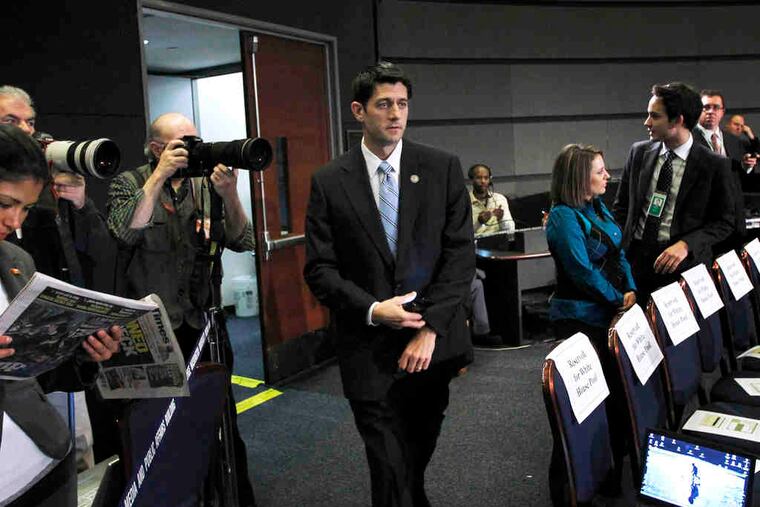PhillyDeals: Isn't it rich? Capitalists who accept higher taxes
"I refuse," President Obama said Wednesday, to keep extending lower federal tax rates to "millionaires and billionaires." He wasn't specific about whether he was going to insist on tax rates going back up to where they were during George W. Bush's first term. In Bush's second term, there were across-the-board cuts for people earning more than $1 million a year, people earning more than $250,000 a year, and for investment profits.

"I refuse," President Obama said Wednesday, to keep extending lower federal tax rates to "millionaires and billionaires."
He wasn't specific about whether he was going to insist on tax rates going back up to where they were during George W. Bush's first term. In Bush's second term, there were across-the-board cuts for people earning more than $1 million a year, people earning more than $250,000 a year, and for investment profits.
Democratic leaders in the last Congress made separate proposals to restore tax levels in all three categories but were voted down by nervous lawmakers from their own party.
The threat of a return to higher taxes on financially successful Americans sank the Democrats in the November elections. Voters who backed Obama in 2008 in affluent suburbs such as the Main Line and Bucks and Burlington Counties reversed course, dumped their local Democrats, and voted Republicans into control of the U.S. House of Representatives and state capitals, including Harrisburg.
So how are the rich - and the larger group of Americans who think they're rich, want to be rich, support the rich, or at least trust rich Republicans more than rich Democrats - going to react to Obama's warning that he won't back down next time?
The working rich
Depends on which rich you mean.
Last fall I quoted a handful of Philadelphia-area business owners echoing calls from national figures such as billionaire investor Warren Buffett for a restoration of higher taxes on wealthy Americans as a matter of national fairness and fiscal sobriety.
Financial pros, who specialize in managing rich people's money, tell me their working-rich clients aren't necessarily discouraged to expand their businesses because of higher tax rates.
A bigger burden is the unpredictability of tax rates and tax breaks; subsidies and penalties; and liability, labor, and trade, and pollution laws and regulations as Democrats and Republicans keep rewriting the rules or threatening to.
This politically manufactured instability makes it tough for capitalists to plan.
It's different among those whose money was mostly inherited. As a group, say the pros, those people are more likely to hate taxes, period, and to support politicians who promise to cut them, no matter what. Having lost the capacity to earn more, they fight harder for what's left. Even if that means a fat national deficit.
Maybe the solution is to simplify the tax code, set income-tax rates at some world-competitive level, keep them there for the next 20 or 30 years, and boost inheritance taxes.
Not buying cuts
Rep. Paul D. Ryan (R., Wis.), in his budget proposal last week, recommended the government stop paying medical bills for old, poor, and very ill people, and replace Medicare and Medicaid with private insurance subsidies and block grants to states.
Ryan's goal is to stop the hyperinflation that takes over in any industry that's privately run but largely publicly funded: college education, military spending, medical care. If you pay less, the theory goes, industry will find ways to do the job cheaper.
It's an economist's argument. But hospitals that get paid, or not, in actual dollars, aren't buying it yet.
The Ryan proposal - insurance subsidies as an alternative to Medicare - is "a pure budget solution, not a health-policy solution," Alec Vachon, an aide to the former U.S. senator and GOP presidential candidate Robert Dole (R., Kan.), told the Henry J. Kaiser Family Foundation in an interview published Tuesday in Kaiser Health News. Vachon would prefer that Medicare put limits on which procedures it would fund.
"We do not have enough detail to accurately predict if the [Ryan] proposal would lower medical price inflation and improve coverage," or how precisely it would affect hospitals, Susan Phillips, spokeswoman for Penn Medicine, the University of Pennsylvania hospital system, told me.
But "we can easily confirm that this proposal would lower federal spending on health care," Phillips said.
The three Penn hospitals collect nearly a half-billion dollars a year from Medicare alone.
"Moving people from traditional Medicare onto private insurance rolls will cause a dramatic increase in the volume of claims submitted to these private insurance companies," Phillips said.
"To absorb the cost of this increase in volume, private insurers will have to either cut reimbursement rates to hospitals and providers, or increase premiums for the rest of their coverage population. The most likely result will be a combination of the two."
Which means, Phillips said, "a dramatic increase" in unpaid hospital bills.
Ryan's Medicaid cuts would have a similar effect. A drop in federal funding for state programs would "increase the number of uninsured patients that providers will treat and therefore increase the amount of uncompensated care provided by the state's health systems," Phillips predicted.
And who will pay for that?